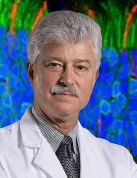University at Buffalo professor recognized for retina research
Steven J. Fliesler, PhD, has been named the 2022 recipient of the Retina Research Foundation’s (RRF) Paul Kayser International Award in Retina Research presented by the International Society for Eye Research (ISER).
The University at Buffalo's Steven J. Fliesler, PhD, has been named the 2022 recipient of the Retina Research Foundation’s Paul Kayser International Award in Retina Research presented by the International Society for Eye Research. (Images courtesy of UB)

University at Buffalo (UB) faculty member Steven J. Fliesler has been named the 2022 recipient of the Retina Research Foundation’s (RRF) Paul Kayser International Award in Retina Research presented by the International Society for Eye Research (ISER).
Fliesler, SUNY Distinguished Professor and Meyer H. Riwchun Endowed Chair Professor of Ophthalmology, will receive the award at the XXV Biennial Meeting of the ISER in February in Australia.
First presented in 1986, the Kayser award recognizes lifetime achievement by a vision scientist who has made a significant contribution to the understanding of vitreoretinal diseases or disorders.
Nominees for and recipients of the award, which is given out every two years, are selected by RRF officials interacting with a committee appointed by the ISER Council.
Steven J. Fliesler, PhD

“This award represents one of the highest accolades one can receive in the field of retinal research,” Fliesler says. “I feel extremely grateful and humbled to receive this singular honor, particularly as it comes from the International Society for Eye Research and the list of prior recipients truly represents a ‘who’s who’ in this field of research.”
An internationally renowned vision scientist, Fliesler is considered the world’s leading expert on cholesterol metabolism in the retina.
He serves as vice-chair/director of research in the Department of Ophthalmology in the Jacobs School of Medicine and Biomedical Sciences. He also holds concurrent appointments as a professor in the Department of Biochemistry and in the neuroscience graduate program at UB, as well as being a research career scientist at the Buffalo VA Medical Center (VA Western NY Healthcare System).
“My research over the years has been focused primarily on understanding how isoprenoid lipid metabolism (as involves cholesterol and biogenically related molecules) supports the normal development and maintenance of the structure and function of the retina,” he says.
Fliesler’s award lecture at the ISER meeting is titled “Hereditary Retinal Diseases: Cruisin’ for a Bruisin’ Down the Mevalonate Pathway.”
The mevalonate pathway generates a host of biologically significant molecules, such as cholesterol and other sterols, bile acids, steroid hormones, dolichols and the 15- and 20-carbon prenyl groups of prenylated proteins, Fliesler explains.
Collectively, these molecules are called “isoprenoids” due to their common five-carbon building block, isoprene.
“Genetic defects in this biosynthetic pathway produce a host of human diseases, which profoundly impact the central nervous system, including the retina,” Fliesler says.
“My award lecture will focus on the impact of defective synthesis of cholesterol and dolichols on the structure and function of the retina, primarily within the context of animal models, either genetically or pharmacologically induced, that mimic human hereditary diseases,” he adds.
“The potential translational applications of knowledge gained from such studies will be discussed, particularly in terms of improving the standard of care for patients afflicted with such diseases.”
Fliesler has published more than 150 peer-reviewed journal articles, book chapters and review articles, and is the editor of two books. His research program has been funded continuously for nearly 40 years by federal and private extramural grants.
He is editor-in-chief of Experimental Eye Research, deputy editor-in-chief of Eye and Vision, an associate editor of Frontiers in Cell and Developmental Biology, and serves on four other journal editorial boards, including Molecular Vision and the Journal of Lipid Research.
Fliesler has received multiple honors and awards, including a James S. Adams Scholar Award and a Senior Scientist Award from Research to Prevent Blindness, silver-tier (2009) and gold-tier (2014) fellow of the Association for Research in Vision and Ophthalmology (FARVO) and a SUNY Chancellor’s Award for Excellence in Scholarship and Creative Activities (2014). He was named a UB Distinguished Professor in 2014 and promoted to the rank of SUNY Distinguished Professor in 2018.
He obtained his doctoral degree in biochemistry from Rice University, did a postdoctoral fellowship at the Cullen Eye Institute/Baylor College of Medicine, and was previously on the faculties of Baylor College of Medicine, Bascom Palmer Eye Institute/University of Miami School of Medicine, and Saint Louis University School of Medicine prior to joining the UB faculty in 2008.